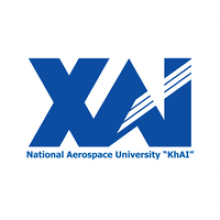KhAI
The National Aerospace University „KhAI” is a leading Ukrainian technical University and the only engineering University in Ukraine that provides a full cycle of higher education in the field of aviation and aerospace engineering. The NAU – KhAI Was founded in 1930 on the basis of aviation division of the Kharkiv Polytechnic Institute. The University has trained about 60,000 engineers. More than 80% of the specialists with higher education who work in Ukrainian aerospace area are the graduates of the NAU KhAI. At present about 9500 students and 160 post-graduate students are trained at the university; 650 teachers and 2.5 ths employers work here. Among them there are 120 professors and candidates of science. In 1992 the KhAI resumed the training of foreign students. Over 1000 foreign citizens from 40 countries of Asia, Africa and America are trained annually at the University.
KhAI is a member of the International Association of Universities (IAU/UNESCO), the Magna Charta of the European Universities (Magna Charta Universitatum), the Partnership of a European Group of Aeronautics and Space Universities (PEGASUS), the European Aeronautic Science Network (EASN).
The Department of Computer Systems Networks and Cybersecurity (CSNCS Department) carries out intensive research and methodical activities aimed on increasing the quality of engineering studies. The main focus of the Department’s research is on assessment, modelling and ensuring dependability, security and resource (energy) efficiency of software, embedded and distributed systems for aerospace, energy, health and business-critical applications. Methods and means of cybersecurity assessment, verification & validation as well as certification and licensing of software and hardware system are key research directions established at the Department during last 7 years and funded by the Ministry of Education and Science of Ukraine. During last 18 years, the staff of the Department successfully collaborate with academic (KTH, City University London, University of Newcastle upon Tyne, Leeds Beckett University, University of Coimbra, Federico II University of Naples, Tallinn University of Technology, Institute of Information and Communication Technologies, Bulgarian Academy of Sciences, etc.), scientific and development companies and enterprises (Samsung, Cisco, RPC „Radiy”, etc.) throughout the world and conduct joint education, training, and research activities.
KhAI has the potential to compete with the best research organizations from the European Research Area and contribute to the advancement of the European markets based on their previous and on-going research activities in the field of functional safety and security especially in cybersecurity systems as demonstrated by their close link and its participation in national and international R& D projects: H2020 ECHO „European network of Cybersecurity centres and competence Hub for innovation and Operations”, 2019-2023; FP7 KhAI-ERA „Integrating the National Aerospace University „KhAI” into ERA”, 2011-2015; ERASMUS+ ALIOT „Internet of Things: Emerging Curriculum for Industry and Human Applications”, 2016 – 2020; TEMPUS SEREIN „Modernization of Postgraduate Studies on Security Resilience for Human and Industry Related Domains”, 2013–2017, etc.
Participation in the CyberEDU project is a great opportunity for KhAI to strengthen the academic collaboration and to build the strategic partnership within the Baltic Sea Region scientific community in the field of Industrial Control Systems cybersecurity with the overall aim to gain mutual profit and excellence in joint research and innovation. KhAI will actively participate in the CyberEDU project aimed on establishment of a sustainable CyberEDU network and launch its first activities aimed on rising of all project partners’ internationalization level. For this purpose, KhAI will bring both technical expertises in cybersecurity as well as international collaboration expertises, in particular experience in setup international training facilities and development of new multi-partner educational programme; expertises in establishing consortia and writing proposals for international funding calls; contacts of international experts and stakeholders in the field of the CyberEDU project interests; etc. Participation in short term mutual visits and NATO ARW workshop (or relevant video meetings if there are still be COVID related travel restrictions) will be very important to establish contact with CyberEDU coordinator (SU) and other partners (ASOIU, BHOS, GSU, UG, UIIP, GRENA, NCBJ).





